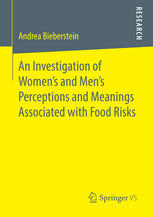

Most ebook files are in PDF format, so you can easily read them using various software such as Foxit Reader or directly on the Google Chrome browser.
Some ebook files are released by publishers in other formats such as .awz, .mobi, .epub, .fb2, etc. You may need to install specific software to read these formats on mobile/PC, such as Calibre.
Please read the tutorial at this link: https://ebookbell.com/faq
We offer FREE conversion to the popular formats you request; however, this may take some time. Therefore, right after payment, please email us, and we will try to provide the service as quickly as possible.
For some exceptional file formats or broken links (if any), please refrain from opening any disputes. Instead, email us first, and we will try to assist within a maximum of 6 hours.
EbookBell Team

5.0
68 reviewsConcern about food risks is widespread. Consumers, however, are found to differ in terms of how they evaluate these risks. One of the most prominent findings in this regard is the differences between women and men. Many studies report that men are less worried about environmental and technological risks than women, which is also the case for food risks. At the same time it is criticized that these differences are often exaggerated, similarities overlooked, and systematic investigations are lacking. Andrea Bieberstein gives a comprehensive overview of theoretical approaches to risk perception and empirical work that has been conducted in the field of risk perception research. Furthermore, she provides a systematic investigation of how food risks are constructed for women and men by uncovering the meanings in terms of associations, feelings, and values that they attach to various food risks. This allows a deeper understanding of the gender differences in risk perception in terms of their relevance and meaning.